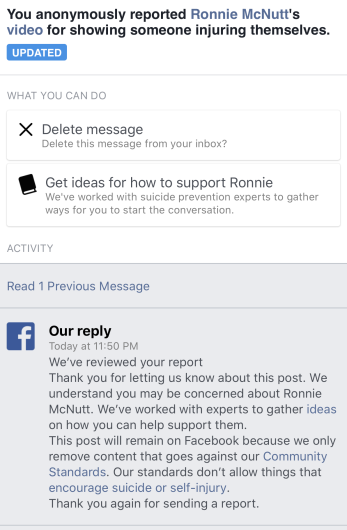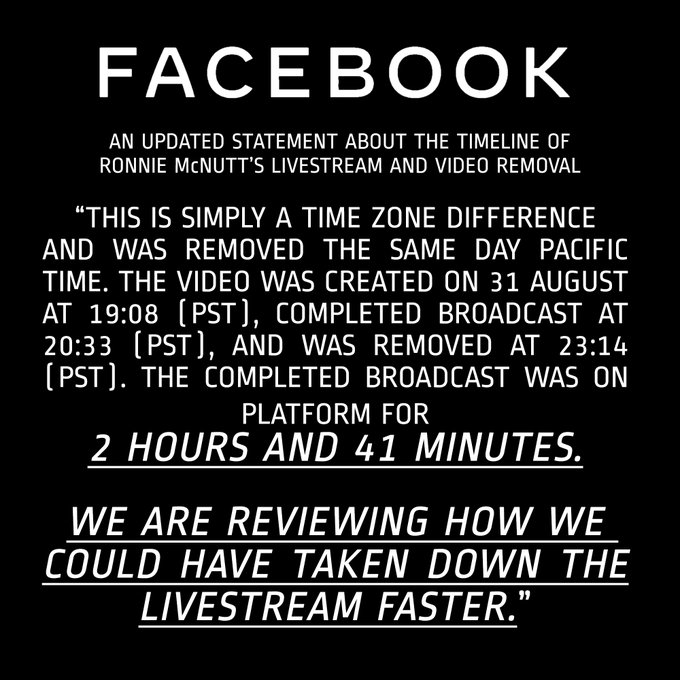
Instagram Ronnie McNutt
Josh Steen, a friend of Ronnie McNutt, is speaking out about the tragic video showing McNutt’s death and the failure of social media platforms in removing it. On August 31, McNutt, 33, died by suicide and streamed his death on Facebook Live. In the days after his death, the video was shared on various social media platforms, especially TikTok, prompting many people to warn users about its presence.
Now, Steen is sharing details about the circumstances surrounding his friend’s public death and says Facebook didn’t do enough to prevent McNutt’s death from being streamed online or to remove offending content about McNutt’s death in the days since. In an interview with Heavy, Steen said, “Facebook could’ve stopped this and didn’t.” He said it is his opinion that Facebook is “directly responsible” for the video being shared online and going viral.
Steen said, “Facebook, Twitter, Instagram, and other social platforms could ban accounts, IPs, and stop the spread of this video. YouTube can flag you for using two seconds of a copyrighted song, but can’t seem to filter out my friend ending his life. It does not make sense.”
McNutt was an Army veteran and lived in Mississippi. Steen said McNutt suffered from PTSD after serving tours in the Iraq War. Steen and McNutt were both involved in local theater and worked together on a podcast, JustUs Geeks. “He didn’t seem to be the same guy that left for Iraq once he exited the service. I spent many a late night in our studio, via text message, and in person talking with him about life and his struggles. Mental health issues are very very real, and I honestly think that there are a lot of people who struggle with all areas of mental illness who let it go untreated. Or treat it with other things, it seems,” Steen said.
Steen Slammed Facebook for Its Response to McNutt’s Livestream, Before & After McNutt’s Death
Steen told Heavy the video that is being shared on social media platforms doesn’t show the whole stream, and having watched the whole stream, Steen strongly believes that McNutt didn’t begin the livestream intending to commit suicide. He said McNutt had often gone on Facebook Live to “ramble,” but in this case, he was “incredibly drunk, and that plus his recent relationship issues led to the end result.”
Steen said about the video:
During his Live, once a podcast listener and friend had notified me that this was all going on, I started watching and gauged the situation. I tried roundabout ways to get associated friends to reach others to prevent what inevitably happened from happening. All of these people were commenting and trying to reach out to him, and he was so upset and inebriated that he was just being incredibly hurtful to them and himself. I tried multiple times to call him, from my cell phone and our phone at the theatre; both numbers he would easily recognize. I watched him pick his phone up, think for a second, and then decline my calls. I really thought that if I could just get him to break his focus for just a second it would be alright. His laugh always made me laugh, and I’m glad that I have our archives to back through to hear it whenever I want to now.
The video was first reported to Facebook while McNutt was still alive, Steen said. During the Facebook Live, McNutt accidentally misfired his gun, which is when Steen was informed of the situation by a friend and joined the livestream. He said, “I actually started reporting the video stream while he was still alive and talking; no response from Facebook.” He also said that police officers had been called and were standing outside McNutt’s apartment watching the livestream. Heavy reached out to the New Albany, Mississippi, police department for more information but did not immediately hear back.

Josh SteenFacebook’s response to Josh Steen after he reported Ronnie McNutt’s livestream video while McNutt was still alive and expressing a desire to harm himself.
After McNutt’s death, Steen said he continued to contact Facebook for hours to request that the video be removed. According to Steen, McNutt died by suicide at 10:30 p.m., and it wasn’t until 11:51 p.m. that he received a response from the platform. According to a screenshot shared by Steen, Facebook’s reply reads in part: “This post will remain on Facebook because we only remove content that goes against our Community Standards. Our standards don’t allow things that encourage suicide or self-injury.”
Steen said he believes it was past 1 a.m. when Facebook eventually removed the video, but by that time he had already seen it reposted in at least one private group. He said, “I called Facebook, who is supposed to have 24/7 support; no answer.”
Steen said:
I actually started reporting the video stream WHILE he was still alive and talking; no response from Facebook. He drunkenly misfired the gun once, a cheap run-of-the-mill rifle, and that alerted someone to contact me. I immediately started reporting the video over and over to Facebook even while the stream was still active once the police officers, who were JUST F***** WATCHING THE LIVE STREAM OUTSIDE OF HIS APARTMENT, were smart enough to move the streaming device to face the wall. Myself and countless others reported the video for HOURS, and do you know what the response was? ‘This post will remain on Facebook because we only remove content that goes against our Community Standards. Our standards don’t allow things that encourage suicide or self-injury.’
It was around 1-1:30 a.m. when the video finally came down. Hundreds, if not thousands, of people reported this video and it was still up. I know for certain that the video had already been reposted by after midnight to at least one private Facebook group. I called Facebook, who is supposed to have 24/7 support; no answer, and they blame COVID-19 as the cause of their lack of customer service. Facebook is directly responsible, and should be legally held responsible, for this video being distributed globally.
Heavy reached out to Facebook for a comment about the video and the platform’s response but has not yet heard back. However, the company said in a statement to BBC, “We removed the original video from Facebook last month, on the day it was streamed, and have used automation technology to remove copies and uploads since that time. Our thoughts remain with Ronnie’s family and friends during this difficult time.”
On September 10, Steen posted to Twitter via the JustUs Geeks account and shared an updated statement from Facebook in which the company said the full broadcast was available on the platform for 2 hours and 41 minutes.
Facebook wrote that “the video was created on 31 August at 19:08 (PST), completed broadcast at 20:33 (PST), and was removed at 23:14 (PST). The completed broadcast was on the platform for 2 hours and 41 minutes.” The company added, “We are reviewing how we could have taken down the livestream faster.”
Many People Have Shared Links to the Video, Images & Memes About McNutt’s Death in Comments on Facebook

InstagramRonnie McNutt
In addition to his criticism of the social media platform’s response to the livestream, Steen also shared his frustration about comments posted to Facebook, especially on McNutt’s and his family’s accounts. He said, “Trolls and bots have been allowed to spam his entire family, even after his Facebook account was turned into a memorial account, because his family doesn’t have access to his account.”
As an example, Steen pointed to McNutt’s final post on Facebook, an image with a quote, which now has over 5,700 comments. He explained that many of those comments include links to the video or explanations about where to find it, or memes and images showing his friend’s suicide. McNutt’s friends have continuously reported those comments, he said, but added that “somehow THOSE don’t seem to qualify as going against Facebook Standards, mainly it seems, because Ronnie is already dead.”
Steen believes that social media platforms like Facebook should do more in situations like these. “If someone dies, much less chooses to take their own life, it should not be allowed to be openly traded like a GIF from ‘The Office’ on social media,” he argues. “The word ‘standards’ means something, and these social channels should be held legally responsible for the pain and suffering Ronnie’s family is going through.”
He said the past week has been difficult:
I’ve lost a whole lot of faith in humanity this week. I get that a lot of the reasons his video is making its way around is because of bots and trolls, but a lot of real people are continuing to share this video.
I watched my friend die, with police and his friends outside of the apartment, and for what? Him to be a meme? A joke? To have this horrific image that I will never unsee be hidden inside of cat videos on the internet as some kind of a sick prank? It is absolutely outrageous.
Steen added, “One dark moment shouldn’t define your life, and Ronnie left a beautiful digital trail of his, with encouraging videos, podcasts, and words of hope to geeks, normal people, and those struggling to just belong or exist. He was an encouraging source of joy to me, and that’s how I’ll always choose to remember him. I’ve had a lot of people say to me, ‘Man, I wish I could’ve gotten to know this guy.’ I wish they could’ve too.”
Facebook Has Previously Been Criticized for Its Response to Violent Livestreams
This isn’t the first time the social media giant has been criticized for its response to livestreams showing violent content. In 2019, the company came under fire for its failure to respond to the massacre in Christchurch, New Zealand, during which a terrorist livestreamed himself killing 50 Muslim worshippers, the Guardian reported. After two weeks of silence, Facebook COO Sheryl Sandberg said the company would look into restrictions on livestreams but did not outline clear policy changes.
According to the outlet, Sandberg said Facebook would be “investing in research to build better technology to quickly identify edited versions of violent videos and images and prevent people from re-sharing these versions.” However, it’s unclear if any measures have been put in place since then.
Steen said about the video of his friend:
The video is everywhere; literally everywhere. I made a post of remembrance very shortly after he passed because I was just so heartbroken, and because I did so, I inadvertently sent at least 10 people to his profile where Facebook autoplayed the video either at the moment of his death or strategically right after. I am scarred from seeing it; I will never ever be able to unsee that, and I caused people to have to see it? That’s really messed me up. But, knowing that people are seeing this hidden in normal YouTube videos, through memes on Reddit of him slumped over and dead AND IN HIS OWN FACEBOOK COMMENTS, how the hell can I ever just randomly browse the internet without fear or reliving this?
It’s gross, and it’s not funny. At all. Facebook can claim that they don’t have the resources to monitor this all they want to, but it’s almost as if it’s being allowed somehow, and for some reason.
As a New York Times article from April 2017 pointed out, many brutal livestreams have been posted to the platform, including the murder of two radio journalists in the Dominican Republic who were shot while on Facebook Live, the death of Philando Castile, who was shot by police during a traffic stop, and the rape of a woman in Sweden that was streamed live on a private Facebook group.
Steen said about those spreading the video:
I only hope that none of these disgustingly sick individuals never EVER has to go through the pain of publicly losing someone in this manner. I hope they don’t. And I hope their mother doesn’t witness it, begging them to stop. Ronnie McNutt was far more to this world, to people who knew him and not, than his one darkest moment, and I will do everything in my power to make sure this issue does not go away. If someone dies, much less chooses to take their own life, it should not be allowed to be openly traded like a GIF from “The Office” on social media. The word ‘standards’ means something, and these social channels should be held legally responsible for the pain and suffering Ronnie’s family is going through.
Steen said his view of social media has changed. He told Heavy, “Some of the greatest comfort I had after my Mom died of cancer was going back through her social media. To see our interactions, to see what she said to others, and to somehow feel somewhat connected with her. His poor mother can’t, because why would she want to risk seeing that again?”
READ NEXT: TikTok Works to Take Down Disturbing Suicide Video as Users Share Warnings


